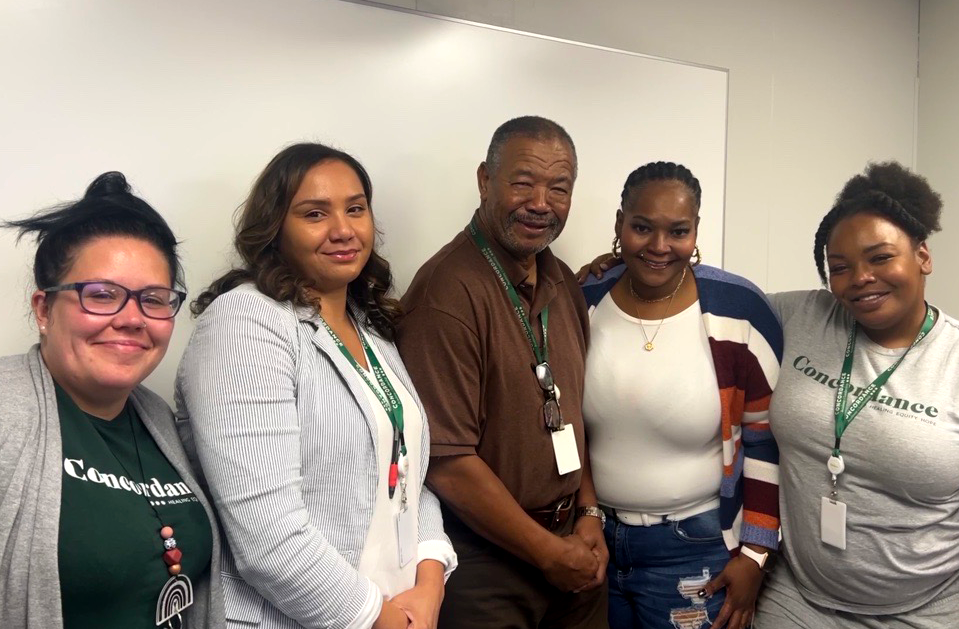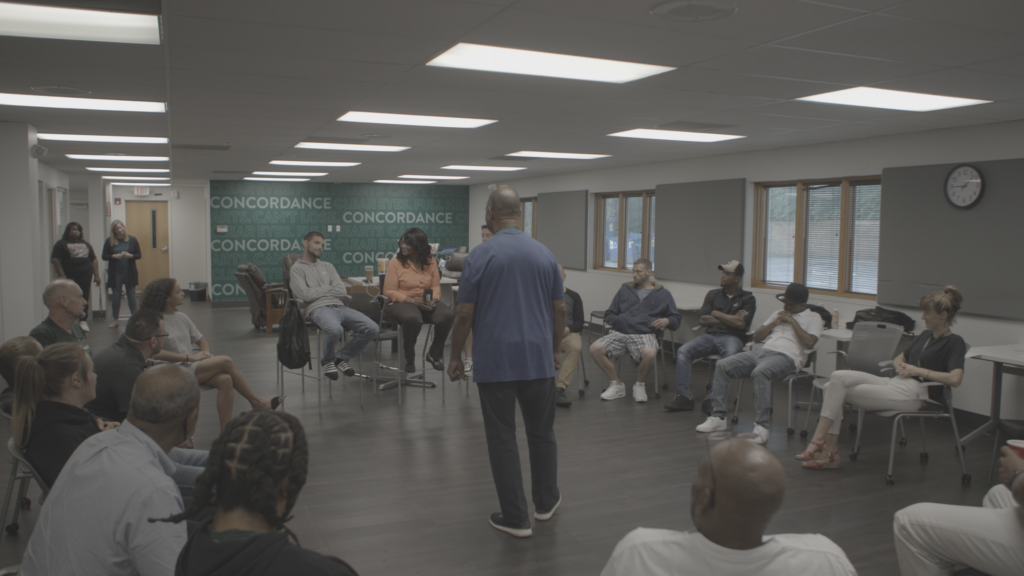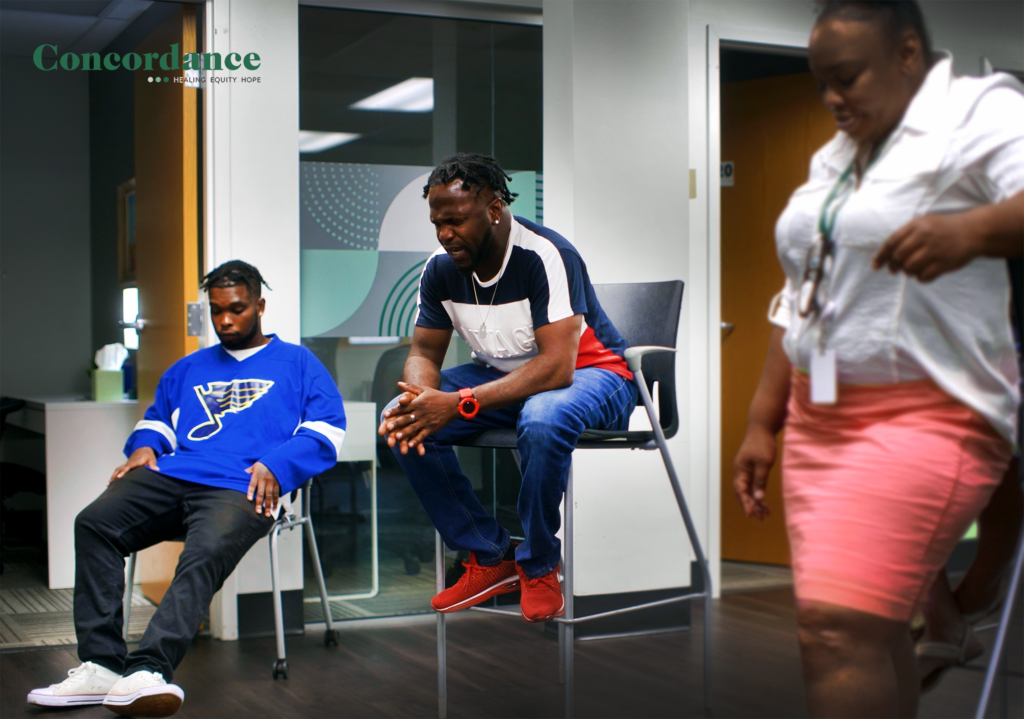From Tameka Jones, Marketing Manager: On a regular Thursday afternoon, I was able to sit down and chat with five members of the Concordance care team, who in their different functions, serve our participants during their post-release journey. This was a rare and beautiful occasion for all of them to sit together and discuss how they collaborate, supporting one another in the participant recovery process.

With (left to right)
Linda Moss, Career Coach
Brittney McIntyre, Case Manager
Henry Allen, Community Support Specialist
LaQuitta Wilder, Therapist
Crystal Chatman, Peer Support Specialist
What does true recovery mean to you?
Henry: Is there such a thing as true recovery?
Brittany: Yeah, I thought the exact same thing.
Crystal: It most definitely is! Glad you asked that question, guys. You know, you can be abstinent not using drugs, however, not be in a recovery process. Because recovery is an active change in ideas and behaviors. If we want to go with how SAMHSA defines recovery – it is a process of change in which an individual improves health and wellness and strives to reach their fullest potential. Basically, you have to change the way you think and behave. Because addiction is a disease of the mind that alters the way you think. And if your thinking is altered, the more likely your behavior is altered. So recovery looks like a change in both of those things. The consistent, ongoing change – that’s what true recovery is.
LaQuitta: To me, it means what Crystal just described.
What makes your individual role valuable to the participants’ recovery journey?
Crystal: I have actually been informed by people of how unique my role is because of that I am okay with total transparency. I am a person in recovery. So with my journey of having that lived experience, it allows me a unique perspective because I collaborate with individuals that don’t necessarily share that life experience but may have more of a book knowledge.
Brittany: My role is similar to crystal because I am formerly incarcerated. I had relatable experience, too. So when I speak to participants and they’re going over the obstacles that they’re facing — I’m able to identify with them like, “Yeah, it is hard… you are going to have these options. This is the journey.” So being able to highlight that and guide them through and tell them, yeah, it’s hard. You’re going to have to do 101 more things than the next person, but this is what we’re going to focus on. So just being able to be honest and upfront, that’s where I think I can relate.
Henry: I don’t have a lived experience as far as recovery, but I also am formally incarcerated and that’s why I feel like that I really have identified with a lot of the participants. They have a tendency of relaxing with me then. When we’re driving to appointments, they really open up, and I tell them… this is a journey. Take your time doing Concordance. This is a marathon race, not a 100 yard dash. Do not try to put too much stuff on your plate at one time. You have to heal yourself first, okay? So as a community support specialist, I’m trying to put them at ease and see a different light. I tell participants you have a case manager, a therapist, a peer support specialist. You might be a little reluctant telling them certain things but they are there to help you.

LaQuitta: The one thing I want to say about Henry — (turns to Henry) you’re a vital part of the recovery process. For instance, when participants need treatment from ARCA, you take them to do that. When I feel like we need to get them to their mental health classes — which is a big contributor of their relapse prevention — you take them. When they need comfort meds, you take them to get their prescriptions. So you play your role in their recovery is just as vital as ours is — you definitely play a big part.
Henry: Man, I’ll never forget one of the participants was coming down from a high. And I had to rush him to ARCA one morning. And we had to literally put a trash can in the vehicle as I was transporting him. So you know, trying to comfort him because he was in bad shape. I was telling him, “Just hold on a little while longer. We’re going to be there. Just hold on. You’re going to be OK, you know.”
Crystal: (turns to LaQuitta) So what you been doing here?
LaQuitta: So I feel like my role in the recovery process is to provide a safe place. First of all for them to be able to share, acknowledge, and get the support they need without being judged. And then, educating them on the disease concept of addiction because even though they’ve gone through it and they have been in addiction, they may not necessarily know. So I help them to recognize the triggers — the trauma that initiated the desire to use then creating the relapse prevention plan… which is the “break in case of emergency plan”. And then I work with Brittany and Henry, on the back end.
Linda: I am fairly new, but I think my role as far as recovery is supporting participants before and while they are transitioning to part time employment — which is very stressful and overwhelming. I see my role as a source of comfort and positive reinforcement. I find myself saying, “Listen, it’s going to be stressful, but I’m in your corner. You have a career coach to have your back, and I am going to help you.” If I see a participant struggling and their behaviors are telling me maybe they’re not quite ready for that big transition, then I have the opportunity to reach out to the case manager.
Henry: You know, it’s amazing you said that because a lot of these guys have never had a job that they went to.
Linda: And they’re scared. It is very scary.
Henry: A new adventure for them for someone to care about them and to say “Okay, now it’s time for you to go to part time employment.” They ask, “What does that look like? I’ve never had a job before. You know what’s expected of me?” You know that that’s a scary thought.
Crystal: And I think it is great that they have a career coach because you prep them and give them insight on what an employer expects. The chances of rejection or failure lessen because they’re equipped with what they need, because rejection and failure can very well lead a participant to believe that this is not a fit for them. And with that belief, they could end up somewhere they don’t want to be like back using or reincarcerated.
What do you want others to know about how you work alongside each other to ensure like participants are getting what they need for recovery?

LaQuitta: The way our team is set up – it is vital. The work couldn’t happen without every component of the team. It is like Voltron. If one of those parts is missing, we can’t get the job done. It is the continual care that is most important. It’s definitely hard and a big part of it being hard is because there are so many nuances and moving pieces. But it’s necessary and it’s working. The reward is when we get to see the outcome and the success in our participants.
Brittany: I agree with LaQuitta that it is very necessary. This is a very vulnerable population with that needs a lot of support, so we have to be able to provide the support in the best way that we can.
Henry: I think about the collaboration of this team. One of us might hear something from a participant through casual conversation. So now it’s time for us to jump in. What can we do to help out? Case in point, it hasn’t happened recently, but some time ago we overheard a participant saying, “You know, I come here in the daytime and a lot of things are provided for me. But when I go home, I don’t even have any food at home for my kids to eat right away.”. So we went in our storeroom and put together like a bags of food and drinks for him to take home. No problem. We have a storeroom full of that stuff, and we can always reorder. But when a young man leaves here, goes home and he has no food for his kids to eat. Then we expect him to come here the next day and be in good spirits? Yeah, that is not acceptable. So that that is why I like the collaboration part of this team. When we hear something, we pass it on.
Linda: I was just going to say, I have overheard a participant say to multiple new participants, “Listen, man, just stick with the program. Concordance got your back.” And I’ve heard him say it over and over. And he means that and they view us as a cohesive unit and that’s it’s really cool to overhear.